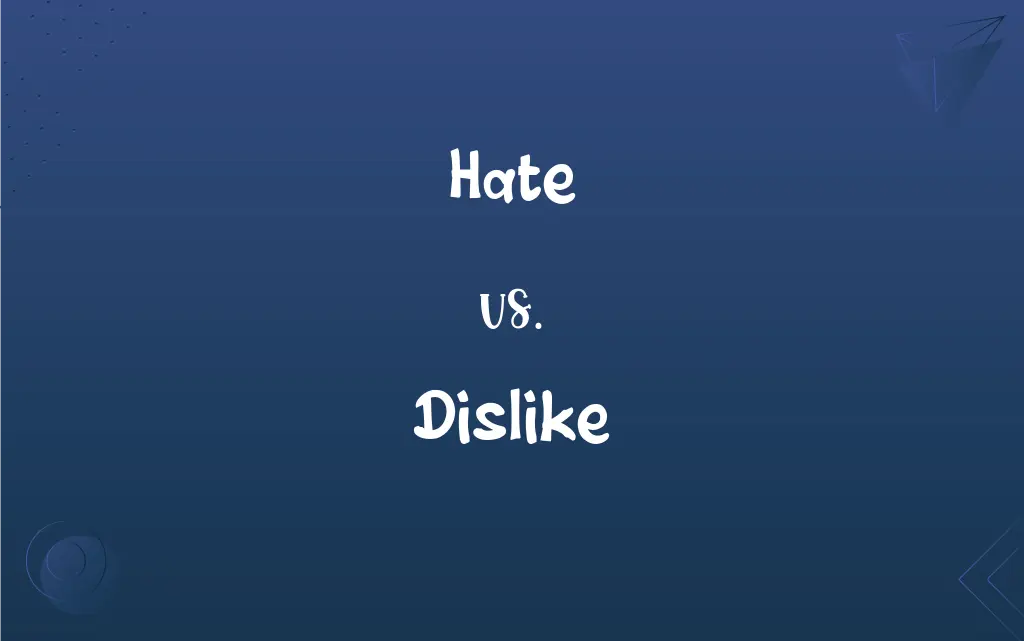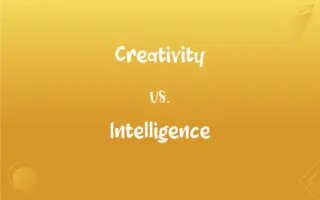Hate vs. Dislike: What's the Difference?
Edited by Janet White || By Harlon Moss || Updated on October 20, 2023
Hate is an intense aversion or hostility; dislike is a milder disapproval or aversion.

Key Differences
Hate and dislike are emotions that signify aversion, but they operate at different intensities. Hate often signifies a deep-seated loathing, enmity, or resentment towards something or someone. Conversely, dislike represents a more moderate or milder form of aversion, often without the depth of emotion seen in hate.
The implications of expressing hate versus dislike can differ considerably. Declaring that you hate something can convey a stronger, sometimes even aggressive sentiment, potentially leading to conflicts or misunderstandings. Mentioning you dislike something, however, is usually considered more temperate, suggesting a preference rather than an intense emotion.
In some contexts, the distinction between hate and dislike can be subtle yet crucial. For instance, in legal terms or societal norms, acts driven by hate, like hate crimes, are viewed more severely because of their intense nature. On the other hand, acts stemming from mere dislike might not carry the same weight or consequence.
When navigating interpersonal relationships, understanding the difference between hate and dislike is vital. Expressing hate might sever ties, as it suggests a profound negative emotion. Expressing dislike, while still denoting disapproval, may leave room for dialogue or compromise since it lacks the intense animosity that hate carries.
Comparison Chart
Intensity
Intense aversion or hostility
Milder disapproval or aversion
ADVERTISEMENT
Implication of Expression
Can be aggressive or lead to conflict
More temperate, suggests a preference
Associated Acts
Hate crimes, severe discrimination
Acts of personal preference, less severe actions
Interpersonal Impact
Might sever ties due to profound negative emotion
Leaves room for dialogue or compromise
Nuance in Usage
Implies deep-seated loathing
Implies a lack of preference or mild aversion
Hate and Dislike Definitions
Hate
Profound resentment or hostility.
He felt a sudden hate for the situation he was in.
ADVERTISEMENT
Dislike
A milder form of negative emotion than hate.
While she doesn't hate the movie, she does dislike it.
Hate
An emotion opposite to love or affection.
Where there is love, there should be no room for hate.
Dislike
Not being in favor of something.
I dislike the idea of waking up early on weekends.
Hate
Deep-seated loathing or animosity.
She began to hate the villain in the story.
Dislike
A feeling of distaste or aversion.
I dislike cold weather immensely.
Hate
Intense aversion to something or someone.
I hate injustice and prejudice.
Dislike
Absence of preference for something.
He has a dislike for spicy food.
Hate
A sentiment leading to severe actions or reactions.
Acts of hate have no place in a civilized society.
Dislike
Disapproving or not appreciating something.
She expressed her dislike for the new policy.
Hate
To feel strong dislike for or hostility toward
Rivals who hate each other.
Dislike
To regard with distaste or aversion.
Dislike
An attitude or a feeling of distaste or aversion.
FAQs
Can acts of hate be punishable by law?
Yes, certain acts, like hate crimes, can be punishable based on the motive of hate.
Is hate stronger than dislike?
Yes, hate is an intense aversion, while dislike is a milder disapproval.
Is expressing dislike always negative?
Not necessarily. Expressing dislike can simply be sharing a preference or opinion.
How do hate and dislike influence decision-making?
Both emotions can sway choices, with hate potentially leading to more extreme decisions.
What's the opposite emotion of hate?
Love is often considered the opposite emotion of hate.
How can I express dislike without being rude?
Being constructive, understanding, and using moderate language can help convey dislike without being offensive.
Can you change a person's dislikes?
While it's challenging to change personal preferences, exposure and understanding can sometimes alter dislikes.
Can you measure the intensity of hate or dislike?
While challenging to quantify, one can gauge intensity through expression, behavior, or physiological responses.
Are hate and dislike purely negative emotions?
While they convey aversion, understanding them can provide insight and growth opportunities.
Is hate always related to people?
No, one can hate situations, conditions, or even inanimate objects.
How does society view hate speech?
Hate speech is typically condemned as it promotes discrimination or harm based on intense negative feelings.
Is it harmful to suppress feelings of hate?
Suppression can be unhealthy. It's better to address and process feelings of hate.
Is it okay to dislike certain things?
Yes, everyone has personal preferences, leading to dislikes.
Why is hate considered a strong word?
Because it conveys profound negative emotion, often leading to severe actions or reactions.
Is disliking something always permanent?
No, dislikes can change over time based on experiences and changing perspectives.
Can dislike evolve into hate?
Yes, if negative feelings intensify, dislike can evolve into hate.
Is it normal to feel hate?
Everyone feels emotions differently; while feeling hate is human, it's essential to address and manage it.
Can one overcome feelings of hate?
With self-awareness and possibly counseling, one can address and manage feelings of hate.
Can you dislike a trait but still like a person?
Absolutely. It's possible to dislike certain aspects but still appreciate the overall individual.
How do I differentiate between my dislikes and societal influence?
Self-reflection and understanding personal feelings can help differentiate genuine dislikes from societal influence.
About Author
Written by
Harlon MossHarlon is a seasoned quality moderator and accomplished content writer for Difference Wiki. An alumnus of the prestigious University of California, he earned his degree in Computer Science. Leveraging his academic background, Harlon brings a meticulous and informed perspective to his work, ensuring content accuracy and excellence.
Edited by
Janet WhiteJanet White has been an esteemed writer and blogger for Difference Wiki. Holding a Master's degree in Science and Medical Journalism from the prestigious Boston University, she has consistently demonstrated her expertise and passion for her field. When she's not immersed in her work, Janet relishes her time exercising, delving into a good book, and cherishing moments with friends and family.































































